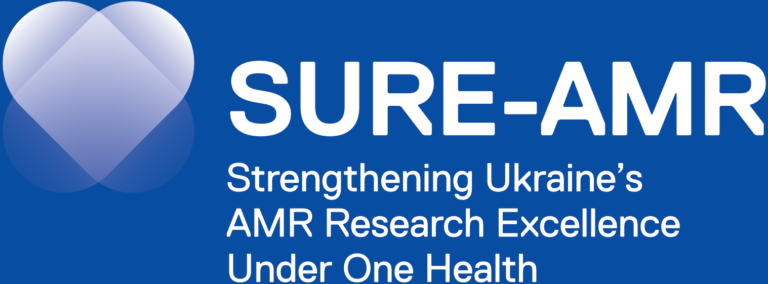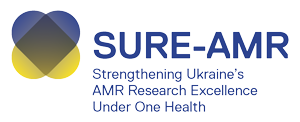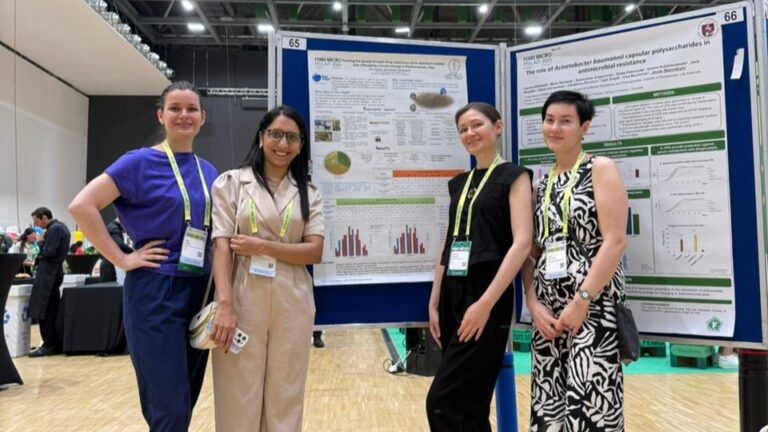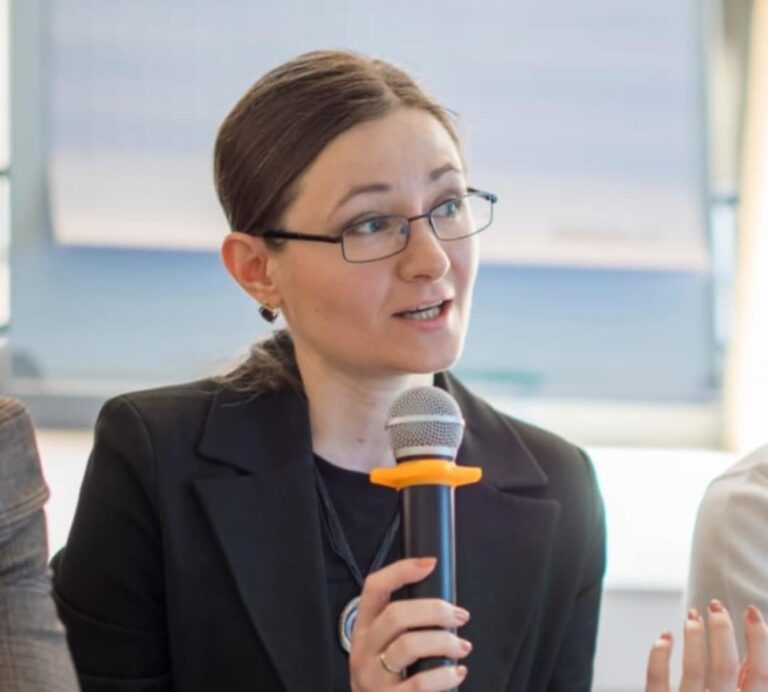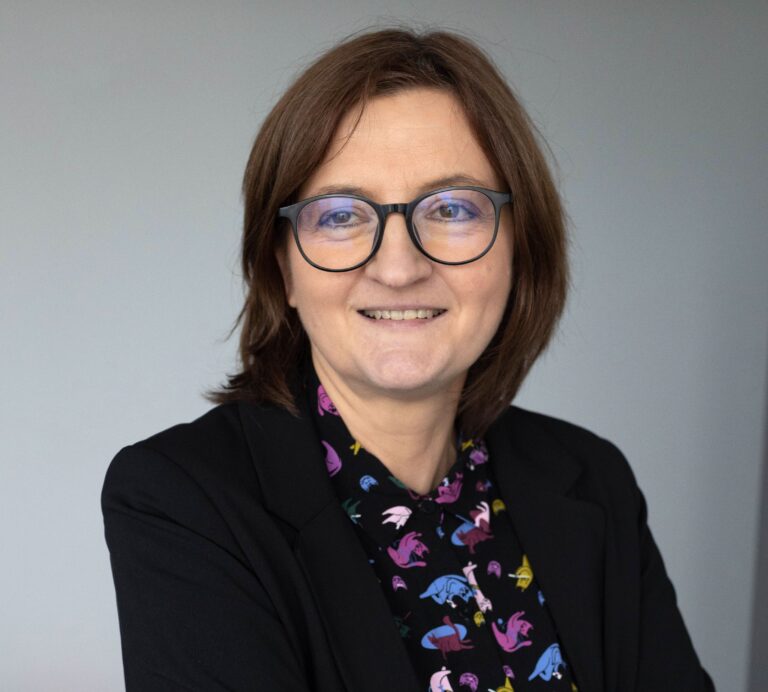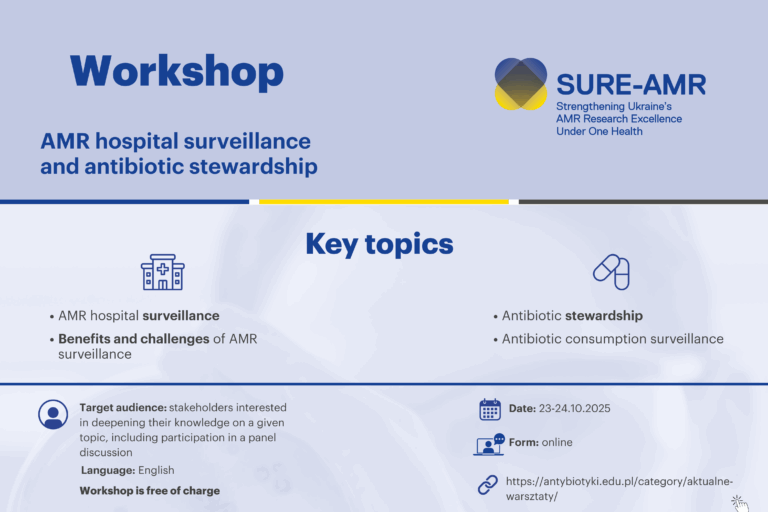Olena Moshynets is a Senior Researcher in the Biofilm Study Group at the Department of Cell Regulatory Mechanisms, Institute of Molecular Biology and Genetics (IMBG) in Kyiv, Ukraine. She has now taken the lead in the fight against Antimicrobial Resistance (AMR) in the country and is coordinating the EU-funded SURE-AMR project to start addressing this challenge
What unique challenges related to AMR does Ukraine face?
In my feeling, Ukraine has faced a severe epidemiological crisis with Gram-negative bacteria since 2017. The COVID-19 pandemic worsened the situation, and the war led to further infections in wounded patients. Besides, international medical support was minimal at the war’s onset, leaving us to struggle alone. We needed more expertise, trained professionals, antibiotics, and advanced technologies to treat patients, but there are no political decisions addressed the crisis. The convergence of war, COVID-19, and declining medical education and skills have made us a hotspot for Antimicrobial Resistance (AMR). As a result, we have now detected super-resistant and virulent strains, including isolates (pure cultures of microorganisms) already resistant to cutting-edge antibiotics not yet in use. Ukraine may now be a major global source of resistance, and that is a complex and urgent problem.
“We have now detected super-resistant and virulent strains, including isolates already resistant to cutting-edge antibiotics not yet in use”
What aspects do you see as critical?
The lack of knowledge and education is a major issue. Many clinicians do not understand antibiotics or their proper use and are unaware of the advances in antibiotic application. Scientists remain disconnected from clinical practice, and policymakers are detached from lab and hospital realities. AMR remains unacknowledged, with the government hiding the problem instead of addressing it, due to a deep-rooted post-Soviet mindset that discourages openly discussing issues, further hindering progress. As a result, there’s no active research, projects, or pharmaceutical collaboration. Honestly, without urgent action and open dialogue, the problem will only worsen.
How important is the international collaboration?
Acknowledging this reality and taking action is crucial at all levels—clinicians, scientists, and policymakers—. With the SURE-AMR project, funded by the European Union, we are starting from the ground up, aiming to enhance specialists’ knowledge in both science and clinical practice. This initiative provides a vital platform to engage with countries and societies that have the expertise to address the AMR problem effectively.
“Many fear being held responsible, but our goal is not to find fault—we seek solutions to improve the situation”
How does stakeholder partnership impact the success of Sure-AMR?
Stakeholders could play a crucial role, but engaging national partners remains challenging, as many are unwilling to discuss the problem. Therefore, our priority is to raise awareness and ensure they recognize our work and findings. For instance, I spoke with the Minister of Health, who showed interest, but it’s still difficult for them to get involved at the moment, because of the current situation. Changing this mindset will be difficult, but it is necessary. Moreover, it’s important to communicate the urgency of addressing the AMR issue without assigning blame. Many fear being held responsible, but our goal is not to find fault—we seek solutions to improve the situation.
What motivated you to lead the Sure-AMR project?
With no existing teams working on antimicrobial resistance in Ukraine, I had to step up. Ideally, I would have joined an established team, but no one else took the lead. I’ve always been passionate about antimicrobial resistance and its clinical applications, and this project was a unique opportunity to apply my knowledge and gain practical experience. Though my background is in research, not management, this work is crucial for Ukraine, and we are committed to doing our best.
“The project will lay the foundation for ongoing research in Ukraine”
What are Sure-AMR’s long-term goals for the next 5-10 years?
Here in Ukraine, we’ve stopped focusing on the future because it’s so unpredictable, but I like to stay positive. A major achievement and a true success would be establishing a national program for epidemiological investigation of antimicrobial resistance using the One Health approach in 5-10 years. However, if we can’t get the government’s attention, we’ll continue collecting and analyzing AMR data. The project will lay the foundation for ongoing research, and any future epidemiological observations in Ukraine will be a key outcome of Sure-AMR.
